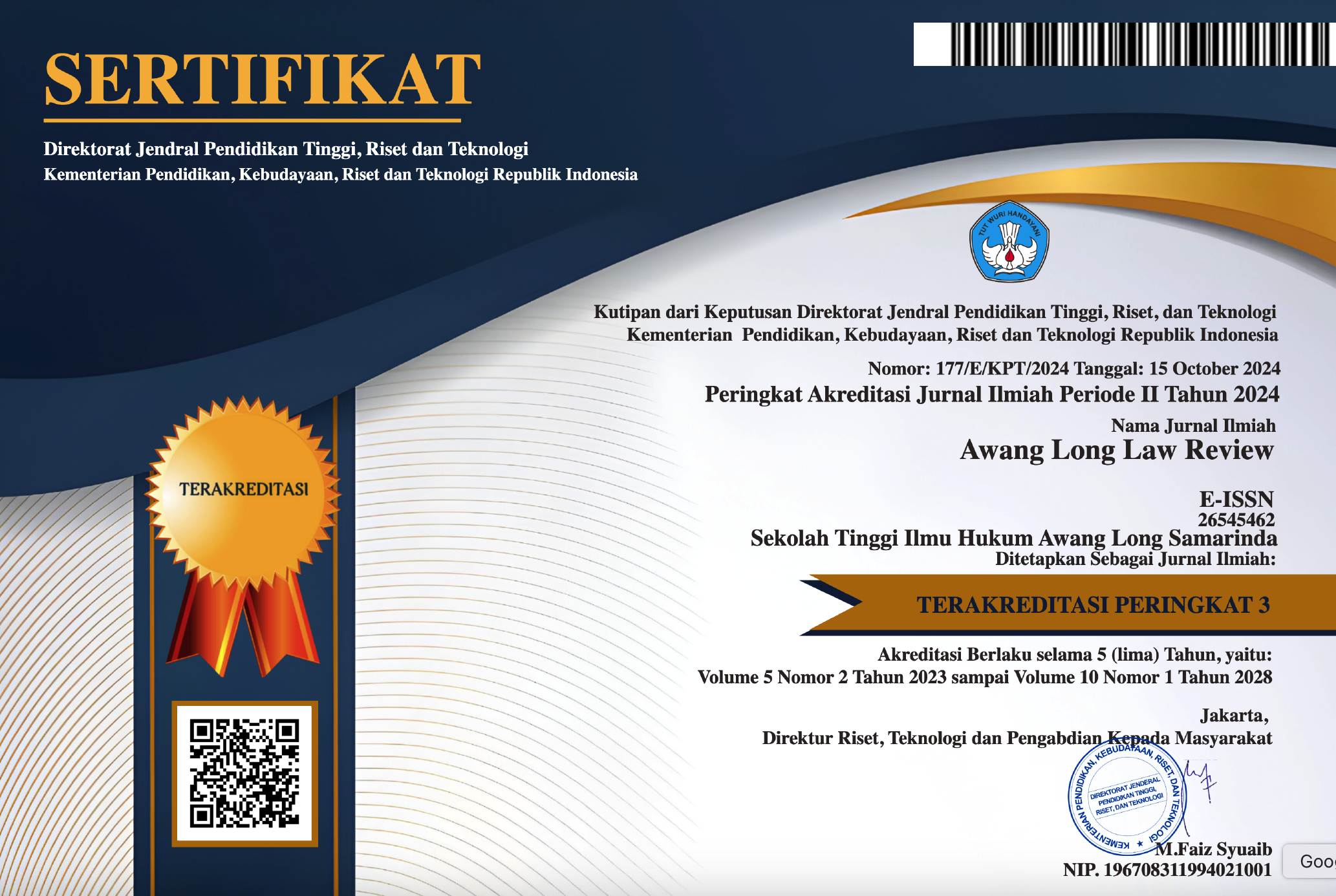POLICY STRATEGIES IN HANDLING ROHINGYA REFUGEES IN INDONESIA TO SUPPORT SUSTAINABLE JUSTICE
Abstract
Indonesia’s position as a transit country for refugees presents complex challenges in law enforcement, financial stability, social security, and foreign policy. Despite Indonesia’s commitment to refugee protection under Article 27 paragraph (2) of Law No. 37 of 1999 on Foreign Relations and Presidential Regulation No. 125 of 2016 concerning the Handling of Refugees from Abroad, many legal and institutional gaps persist. This study employs a normative juridical method to examine two key questions: (1) the legal status of Rohingya refugees under international and national law, and (2) the legal strategies that Indonesia can adopt to promote sustainable justice in refugee management. The findings reveal that the arrival of Rohingya refugees in Banda Aceh on 14 November 2023 highlights the lack of clear legal recognition, as current procedures do not align with the 1951 Refugee Convention, the 1967 Protocol, or Law No. 9 of 1992 on Immigration. Although legal violations are evident, humanitarian considerations and the non-refoulement principle remain fundamental. To address these challenges, this research proposes strategic policy measures, including strengthening collaboration with local communities and NGOs, promoting economic empowerment through taxation on income-generating refugees, and utilizing third-party donor funding schemes to facilitate refugee relocation to countries that are parties to the Refugee Convention.
Downloads
References
Abdul, L. M., Paseki, D. J., & Sinaga, T. B. (2024). Prespektif Hukum HAM Terhadap Pengungsi Akibat Konflik Menurut Konvensi Wina 1951 Tentang Pengungsi. Fakultas Hukum UNSRAT Lex Privatum, 13(5), 4.
Aceh, D. S. I. (2024). Rohingya, antara kewajiban kemanusiaan dan hukum. https://dsi.acehprov.go.id/berita/kategori/mimbar-baiturrahman/rohingya-antara-kewajiban-kemanusiaan-dan-hukum
Adriansyah, A. (2023). Mengapa Warga Lokal Menolak Pengungsi Rohingya di Pulau Weh. VOA Indonesia.
Azaria, D. P. (2022). Penguatan Kelembagaan Penanganan Pengungsi Agenda 2030 Sustainable Developments Goals. Jurnal Esensi Hukum, 4(1), 55–65. https://journal.upnvj.ac.id/index.php/esensihukum/article/view/122
Badan Riset dan Inovasi Nasional. (2023). Eskalasi Persoalan dan Pencarian Solusi Terbaik untuk Pengungsi Rohingya di Indonesia.
Bintarawati, F., Lubis, A. F., Iqsandri, R., & Utama, A. S. (2023). Tantangan dan Prospek Perlindungan Hukum dan Hak Asasi Manusia bagi Pengungsi Rohingya di Indonesia dari Perspektif Masyarakat. Jurnal Hukum Dan HAM Wara Sains, 2(12), 1174–1175. https://doi.org/10.58812/jhhws.v2i12.871
Christyanti, B. L. (2016). Komitmen tanpa ratifikasi: Peran Indonesia terhadap pengungsi dari luar negeri. Jurnal Hukum Internasional, 125, 107.
Grossman, A., & Post, L. (2019). Missing persons: Refugee left out and left behind in the sustainable development goals.
Hartati, A. Y. (2013). Konflik etnis Myanmar (Studi eksistensi etnis Rohingya ditengah tekanan pemerintah). Universitas Wahid Hasyim Semarang.
Independen, A. J. (2023). Media jangan mengamplifikasi narasi kebencian saat memberitakan pengungsi etnis Rohingya. https://aji.or.id/informasi/media-jangan-mengamplifikasi-narasi-kebencian-saat-memberitakan-pengungsi-etnis-rohingya
Initiative, H. (2024). Citi Foundation pilih Human Initiative di Indonesia untuk Global Innovation Challenge 2024 guna tangani isu tunawisma dan pengungsi. https://human-initiative.org/citi-foundation-pilih-human-initiative-di-indonesia-untuk-global-innovation-challenge-2024-guna-tangani-isu-tunawisma-dan-pengungsi
Mamis, S., Rustan, A. S., Arnus, S. H., & Basri, H. (2024). Framing Media Dan Dinamika Opini Publik TerkaitPengungsi Rohingya Di Indonesia: Perspektif UNHCR Dan Otoritas Aceh Dalam Sorotan Kritis. Wardah, 24(2), 142. https://doi.org/10.19109/wardah.v24i2.21384
Marzuki, P. M. (2014). Penelitian Hukum: Edisi Revisi. Kencana Prenada Media.
Primadasa, C. P., Kurnia, M. P., & Erawaty, R. (2021). Problematika Penanganan Pengungsi di Indonesia Dari Perspektif Hukum Pengungsi Internasional. Risalah Hukum, 17(1), 47–50. https://doi.org/10.30872/risalah.v17i1.380
Sakharina, I. K., & Kadarudin. (2016). Hukum Pengungsi Internasional.
Shalihah, F., & Nur, M. (2021). Penanganan Pengungsi Di Indonesia. In UAD Press. https://doi.org/10.34005/veritas.v2i1.236
Statistik, B. P. (2014). Kajian indikator sustainable development goals (SDGs). Badan Pusat Statistik.
Taylor, E., Yanni, E., Guterbock, M., Pezzi, C., Rothney, E., Harton, E., Montour, J., Elias, C., & Burke, H. (2014). Physical and Mental Health Status of Iraqi Refugees Resettled in the United States. J Immigr Minor Health, 2. https://doi.org/10.1007/s10903-013-9893-6.Physical
Copyright (c) 2025 Athina Kartika Sari, Zulfikar Zulfikar, Much Nurachmad, Kharraz Muazarah

This work is licensed under a Creative Commons Attribution-ShareAlike 4.0 International License.







